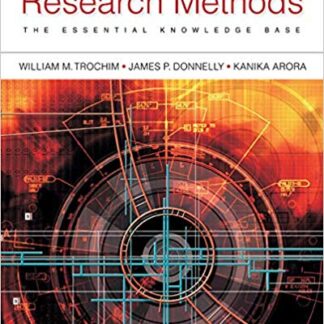Description
Learning and Memory 1st Edition by Darrell S. Rudmann, ISBN-13: 978-1483374833
[PDF eBook eTextbook]
- Publisher: SAGE Publications, Inc; 1st edition (November 24, 2017)
- Language: English
- ISBN-10: 1483374831
- ISBN-13: 978-1483374833
Learning and Memory provides students with a clear, balanced, and integrated presentation of major theoretical perspectives foundational to the study of human learning and memory. Author Darrell Rudmann uses an engaging personal writing style appropriate for students with little or no previous background in psychology to discuss topics including the major behaviorism theories of learning, modern cognitive theories of memory, social learning theories, the roles of emotion and motivation in learning, and the well-established neurological underpinnings of these perspectives. A concluding chapter on learning and memory concepts in the real world shows students to how these concepts are applied in various industries, from advertising to education and the media.
Table of Contents:
Preface
About the Author
1 History of Learning and Memory
Learning Objectives
Overview
“Buddy O’Dell”
Early Philosophical Approaches
Socrates’s Early Functionalism
Aristotle’s Associationism
Descartes’s Dualism
Locke’s Tabula Rasa
Kant’s Interactionism
William James’s Functionalism
A Twentieth-Century Approach: Behaviorism
Contemporary Approaches
Social Learning
Cognitive Psychology
Information Processing Theories
Metamemory Awareness and Strategies
Cognitive Neuroscience
Integrating the Approaches
Themes in the Book
Chapter Summary
Review Questions
Key Terms
Further Resources
References
2 Common Research Methods in Learning and Memory
Learning Objectives
Overview
Common Features
Performance Tasks
Selective Interference Tasks
Performance Measurement
Accuracy
Efficiency
Metamemory Judgments
Brain Functioning
Surveys and Interviews
Memory Diaries
Experiments
Issues of Quality
Chapter Summary
Review Questions
Key Terms
Further Resources
References
3 Neurological Basis of Learning
Learning Objectives
Overview
The Case of H.M.
How Neurons Communicate: Neurotransmission
How Neurons Adapt to Support Learning
Chemical Changes Across Existing Synapses
Changes to the Dendrites
Additional Neurons
Classical Conditioning
Further Applications
Skill Learning
Role of Practice
Role of Feedback
Implicit Learning
What Is Learned in Implicit Learning
Chapter Summary
Review Questions
Key Terms
Further Resources
References
Part I: Part I: Learning
4 Behavioral Learning
Learning Objectives
Overview
Operant Conditioning Theory
Basic Components
Strengthening Behavior
Kinds of Reinforcers
Brain Basis for Reinforcement
Factors That Impact Reinforcement
Schedules of Reinforcement
Ratio Schedules
Interval Schedules
Other Schedules
Shaping
Response Chains
Stimulus Control
Biological Constraints
Summary
Avoidance Conditioning
Learned Helplessness
Weakening Behavior
Effective Punishment
Indirect Issues With Punishment
Decelerators
Overview of Operant Conditioning Theory
Chapter Summary
Review Questions
Key Terms
Further Resources
References
5 Social Learning
Learning Objectives
Overview
Learning by Watching Others
Observational Learning
Imitation
Modeling
Attribution Theory
Self-Efficacy Theory
Self-Regulation Theory
Development of Learning
Piaget’s Theory of Cognitive Development
Primary Assumptions
Piaget’s Stages of Cognitive Development
Sensorimotor Stage (birth until eighteen–twenty-four months)
Preoperational Stage (eighteen–twenty-four months to seven years)
Concrete Operations Stage (ages six–seven until eleven–twelve)
Formal Operations Stage (ages eleven or twelve through adulthood)
Educational Implications
Social Context of Cognitive Development
Chapter Summary
Review Questions
Key Terms
Further Resources
References
6 Affect and Motivation in Learning
Learning Objectives
Overview
Emotions During Learning
Motivation
Intrinsic/Extrinsic Kinds
Classic Motivational Theories
Modern Motivational Theories
Control Theories
Perceived Task Value
Interests
Goal-Setting Theory
Expectancy-Value Theory
Expectancy
Instrumentality
Valences
Work Design Theory
Motivation in Education
Chapter Summary
Review Questions
Key Terms
Further Resources
References
7 Cognitive Learning
Learning Objectives
Overview
Short-Term Memory Store
Processing Information in the Short-Term Memory Store
Features of the Short-Term Memory Store
Causes of Information Loss in Short-Term Memory
Baddeley’s “Working Memory” Model
Verbal Information
Spatial Memory
Episodic Buffer
Central Executive
Conscious Learning
Rehearsal Time
Repetition of Rehearsal
Strategies During Rehearsal
Forming Memories
Consolidation
Neurological Research
Chapter Summary
Review Questions
Key Terms
Further Resources
References
Part II: Part II: Memory
8 Retrieval
Learning Objectives
Overview
Retrieving Memories
The Experience of Retrieval
Feeling of Knowing
Theories of Feeling of Knowing
Retrieval Cues
Prospective Memory
Models of Prospective Memory
The Biological Basis of Retrieving Memories
Disrupting Long-Term Traces
Retrieval to Improve Learning
Repeated Retrieval
Theoretical Explanations for Retrieval Benefits
Situational Effects on Retrieval
Encoding Specificity Principle
Place-Dependent Cues
State-Dependent Cues
Mood-Dependent Cues
Transfer-Appropriate Processing
Retrieval in Groups
Collaborative Memory
Explanations for Collaborative Inhibition
Reducing Collaborative Inhibition
Chapter Summary
Retrieval Strategies
Review Questions
Key Terms
Further Resources
References
9 Episodic and Autobiographical Memories
Learning Objectives
Overview
Episodic Memories
Reexperiencing Past Events
Involuntary Episodic Memories
Visual Perspectives in Episodic Memories
Characteristics of Episodic Memories
Episodic Memory in Contrast With Other Kinds of Memories
Brain Processing of Episodic Memories
Flashbulb Memories
Accuracy of Flashbulb Memories
Autobiographical Memory System
Dimensions and Functions of Autobiographical Memories
Contextual Complexities
The Structure of Autobiographical Memories
Organization by Time or Theme
Emotions and Their Role
Conway’s Self-Memory System
Developmental Changes in Autobiographical Memories
Developing a Narrative
Autobiographical Memory and Older Adults
Brain Processing Underlying Autobiographical Memories
The Autobiographical Memory Retrieval Network
Chapter Summary
Review Questions
Key Terms
Further Resources
References
10 Semantic Memory
Learning Objectives
Overview
Tulving’s Episodic/Semantic Memory Distinction
Remember/Know Judgments
Neuroscience Evidence for a Distinction
Declarative Versus Nondeclarative Distinction
Meaning and Context
Recall in Semantic Memory
Recognition in Semantic Memory
Knowledge Representation
Associationistic Models of Knowledge Representation
Semantic Networks of Associations
Connectivity in Semantic Networks
Connectionist Models
Holistic Approaches of Knowledge Representation
Concepts
Mental Models
Schemas
Structure of Schemas
Functions of Schemas
Scripts
Constructivism
Modern Constructivism
Chapter Summary
Review Questions
Key Terms
Further Resources
References
11 Forgetting
Learning Objectives
Overview
Forgetting Is Normal
Normal Rate of Forgetting
Forgetting Motor Skills
Forgetting Events Over Time
Forgetting Over the Lifespan
Childhood Amnesia
Possible Causes of Childhood Amnesia
Reminiscence Bump
Causes of Forgetting
Decay
Interference
Trace Degradation
Cue Impairment
Cue Availability
Retrieval-Induced Inhibition
Whether Memories Can Be Inhibited Unconsciously
Other Retrieval Errors
Output Monitoring Failures
Source Monitoring Failures
Forms of Source Monitoring Failures
Suggestibility and Bias
False Memories
Chapter Summary
Review Questions
Key Terms
Further Resources
References
Part III: Part III: Advanced Topics
12 Learning and Memory in the Real World
Learning Objectives
Overview
Learning and Advertising: Consumer Research
Advertising
Evoking Emotions Using Advertising
Theoretical Basis for Emotional Conditioning Through Advertisements
Background Music in Advertising
Musical Congruence With Brand
Celebrities in Advertising
Text Versus Visual Components in an Advertisement
Ad Placement
Product Perception
Store Atmospherics
Learning and Education: Classroom Management
Learning and the Workplace: Employee Training
Learning and Aggression: Violence and Media
Experiments on Aggressive Imitation
Numbing Effect
Some Perspective
Memory and the Law: Eyewitness Memory
Chapter Summary
Review Questions
Key Terms
Further Resources
References
Index
What makes us different?
• Instant Download
• Always Competitive Pricing
• 100% Privacy
• FREE Sample Available
• 24-7 LIVE Customer Support




